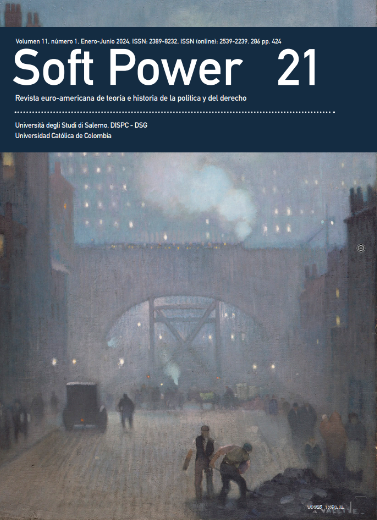
Esta obra está bajo una licencia internacional Creative Commons Atribución-NoComercial 4.0.
Al enviar los artículos para su evaluación, los autores aceptan que transfieren los derechos de publicación a Soft Power. Revista Soft Power para su publicación en cualquier medio. Con el fin de aumentar su visibilidad, los documentos se envían a bases de datos y sistemas de indización, así mismo pueden ser consultados en la página web de la Revista.Resumen
El artículo pretende presentar los contornos de lo que puede designarse como “liberalismo autoritario” en la literatura filosófica y política. El principal objetivo del artículo es destacar las similitudes entre el pensamiento político y económico de Carl Schmitt
y el de Friedrich Hayek. En gran medida, a la crisis de la socialdemocracia de Weimar sucedieron ataques a la propia noción de democracia parlamentaria representativa. En este contexto, Schmitt, conocido por ser antiparlamentario, se apoyó en el concepto de Estado total cualitativo para distinguir lo que denominó Estado total cuantitativo, que caracterizó el periodo de Weimar. Además, Hayek construyó en parte su noción de democracia (limitada) mediante categorías schmittianas, y el pensamiento ordoliberal
no dudó en impulsar su “economía social de mercado” desde la aparente paradoja schmittiana de un Estado fuerte hacia una economía “libre”.

Citas
Bercovici, G. (2004). Constituição e Estado de Exceção Permanente: atualidade de Weimar. Azougue Editorial.
Bielefeldt, H. (1998). Carls Schmitt’s Critique of Liberalism: systematic reconstruction and countercriticism. In D. Dyzenhaus (Ed.), Law as Politics: Carl Schmitt’s critique of liberalism. Duke University Press. https://doi.org/10.1215/9780822377849-002
Bonefeld, W. (2016). Political Theology and German Ordoliberalism: on Europe. Faces de Clio, 2(4).
Bonefeld, W. (2017). The Strong State and the Free Economy. Rowman & Littlefield.
Bonefeld, W. (2020). Economic Constitution and Authoritarian Liberalism: Carl Schmitt and the Idea of a Sound Economy. In The Idea of Economic Constitution in Europe (pp. 182–203). https://doi.org/10.1163/9789004519350_008
Brown, W. (2019). In The Ruins of Neoliberalism: the rise of antidemocratic politics in the West. Columbia University Press. https://doi.org/10.7312/brow19384
Chamayou, G. (2020). Présentation. In C. Schmitt & H. Heller, Du Libéralisme Autoritaire.
Zones.
Cristi, R. (1998). Carl Schmitt and Authoritarian Liberalism. University of Wales Press.
Forsthoff, E. (2000). The total state. In A. Jacobson & B. Schlink, Weimar: a jurisprudence of crisis. University of California Press.
Franco de Sá, A. (2012). Poder, Direito e Ordem: ensaios sobre Carl Schmitt. Via Verita.
Gamble, A. (1996). Hayek: the iron cage of liberty. Polity Press.
Heller, H. (2015). Authoritarian Liberalism? European Law Journal, 21(3), 295–301. https://doi.org/10.1111/eulj.12125
Lazzarato, M. (2017). O Governo do Homem Endividado. N-I Edições.
Llobet Rodríguez, J. (2019). Nacional-Socialismo e Antigarantismo Penal (1933-1945). Tirant lo Blanch.
Mirowski, P. (2009). Postface: defining neoliberalism. In P. Mirowski & D. Plehwe, The Road From Mont Pèlerin: The Making of the Neoliberal Thought Collective. Harvard University Press. https://doi.org/10.4159/9780674054264
Mirowski, P. (2013). Never Let a Serious Crisis Go to Waste: How Neoliberalism Survived the Financial Meltdown. Verso.
Mouffe, C. (1998). Carl Schmitt and the Paradox of Liberal Democracy. In D. Dyzenhaus, Law as Politics: Carl Schmitt’s critique of liberalism. Duke University Press. https://doi.org/10.1215/9780822377849-008
Neumann, F. L. (1996). The Change in the Function of Law in Modern Society. In W. E. Scheuerman, The Rule of Law Under Siege: Selected Essays of Franz L. Neumann and Otto Kirchheimer. University of California Press. https://doi.org/10.1525/9780520917347-006
Neumann, F. L. (2009). Behemoth: The Structure and Practice of National Socialism
(1933–1944). Ivan Dee.
Raz, J. (1977). The Rule of Law and Its Virtue. The Law Quarterly Review, 93.
Samuelson, P. (1981). The World Economy at Century’s End. In Bulletin of the American Academy of Arts and Sciences, 34(8), 35–44. https://doi.org/10.2307/3823369
Scheuerman, W. E. (2020a). Carl Schmitt: The End of Law. Rowman & Littlefield.
Scheuerman, W. E. (2020b). The End of Law: Carl Schmitt in the Twenty-First Century (2nd ed.). Rowman & Littlefield.
Scheuerman, W. E. (1997). The Unholy Alliance of Carl Schmitt and Friedrich Hayek. Constellations, 4(2), 172–188. https://doi.org/10.1111/1467-8675.00047
Schmitt, C. (1990). Sobre el Parlamentarismo. Editorial Tecnos, S.A.
Schmitt, C. (1998). Strong State and Sound Economy: An Address to Business Leaders. In R. Cristi, Carl Schmitt and Authoritarian Liberalism. University of Wales Press.
Schmitt, C. (2000). The Liberal Rule of Law. In A. J. Jacobson & B. Schlink, Weimar: A Jurisprudence of Crisis. University of California Press.
Schmitt, C. (2002). El Concepto de lo Político. Alianza.
Schmitt, C. (2007a). La Guerre Civile Mondiale: Essays 1943-1978. Éditions è®e.
Schmitt, C. (2007b). Legalidade e Legitimidade. Del Rey.
Schmitt, C. (2007c). O Guardião da Constituição. Del Rey.
Schwab, G. (1989). The Challenge of the Exception: An Introduction to the Political Ideas of Carl Schmitt between 1921 and 1936. Greenwood Press.
Slobodian, Q. (2018). Globalists: the end of empire and the birth of neoliberalism. Harvard University Press. https://doi.org/10.4159/9780674919808
Streeck, W. (2015). Heller, Schmitt and the Euro. European Law Journal, 21(3), 361–370. https://doi.org/10.1111/eulj.12134
Wolfe, A. (2009). The Future of Liberalism. Alfred A Knopf.










